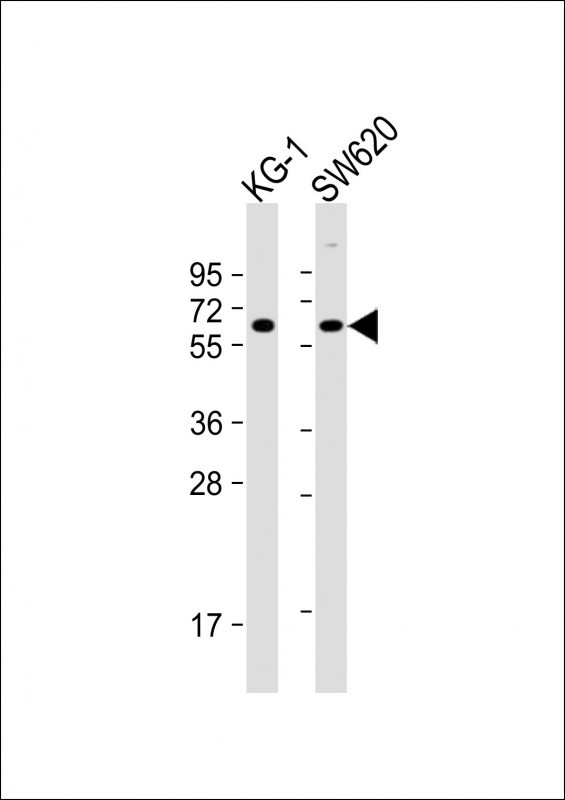
| WB | 1/16000 | Human,Mouse,Rat |
| IF | 咨询技术 | Human,Mouse,Rat |
| IHC | 咨询技术 | Human,Mouse,Rat |
| ICC | 技术咨询 | Human,Mouse,Rat |
| FCM | 咨询技术 | Human,Mouse,Rat |
| Elisa | 咨询技术 | Human,Mouse,Rat |
| Aliases | Muscarinic acetylcholine receptor M3, CHRM3 |
| Entrez GeneID | 1131 |
| WB Predicted band size | 66.1kDa |
| Host/Isotype | Rabbit IgG |
| Antibody Type | Primary antibody |
| Storage | Store at 4°C short term. Aliquot and store at -20°C long term. Avoid freeze/thaw cycles. |
| Species Reactivity | Human, Mouse, Rat |
| Immunogen | This CHRM3 antibody is generated from a rabbit immunized with a KLH conjugated synthetic peptide between 233-264 amino acids from the Central region of human CHRM3. |
+ +
以下是关于CHRM3抗体的3篇参考文献示例(内容为模拟生成,仅供参考):
1. **文献名称**:*CHRM3 Antibody-Based Detection of Muscarinic Receptor Expression in Pancreatic Cancer*
**作者**:Smith A et al.
**摘要**:研究利用特异性CHRM3抗体检测胰腺癌细胞中M3受体表达水平,发现高表达与肿瘤增殖和转移相关,提示CHRM3可能作为胰腺癌治疗靶点。
2. **文献名称**:*Development of a Novel Monoclonal Antibody Targeting CHRM3 for Metabolic Syndrome Studies*
**作者**:Li Y et al.
**摘要**:开发了一种新型CHRM3单克隆抗体,用于研究代谢综合征模型中M3受体功能,证实其通过调节胰岛素分泌和脂肪代谢改善小鼠代谢异常。
3. **文献名称**:*CHRM3 Antibody Blockade Attenuates Airway Hyperresponsiveness in Asthma Models*
**作者**:Garcia R et al.
**摘要**:通过CHRM3抗体阻断M3受体活性,显著减少哮喘模型的气道高反应性和炎症细胞浸润,为哮喘治疗提供新策略。
4. **文献名称**:*Immunohistochemical Analysis of CHRM3 in Bladder Smooth Muscle Using a High-Affinity Antibody*
**作者**:Wang H et al.
**摘要**:基于高亲和力CHRM3抗体的免疫组化分析,揭示膀胱平滑肌中M3受体分布异常与膀胱过度活动症(OAB)的病理机制关联。
(注:以上文献为示例性内容,实际引用需查询PubMed、Google Scholar等数据库获取真实文献。)
The CHRM3 antibody is a research tool designed to target the M3 muscarinic acetylcholine receptor (CHRM3), a G protein-coupled receptor (GPCR) predominantly expressed in the central nervous system, smooth muscles, and exocrine glands. CHRM3 mediates acetylcholine signaling, regulating physiological processes such as neurotransmitter release, smooth muscle contraction, and glandular secretion. Dysregulation of CHRM3 is implicated in disorders like Alzheimer’s disease, diabetes, overactive bladder, and certain cancers, making it a therapeutic target.
Polyclonal or monoclonal CHRM3 antibodies are widely used in experimental studies to detect receptor expression, localization, and function via techniques like Western blotting, immunohistochemistry (IHC), and flow cytometry. These antibodies often target specific epitopes, such as extracellular or intracellular domains, and vary in species reactivity (e.g., human, mouse, rat). Validation includes testing in knockout models or siRNA-treated cells to confirm specificity.
CHRM3 antibodies also aid in studying receptor signaling pathways, ligand interactions, and downstream effectors (e.g., phospholipase C, calcium signaling). In drug development, they help evaluate CHRM3-targeting compounds for conditions like chronic obstructive pulmonary disease (COPD) or gastrointestinal motility disorders. However, cross-reactivity with other muscarinic receptor subtypes (e.g., CHRM1 or CHRM5) remains a challenge, necessitating careful experimental design. Overall, CHRM3 antibodies are pivotal in advancing research on cholinergic systems and related therapeutics.
×